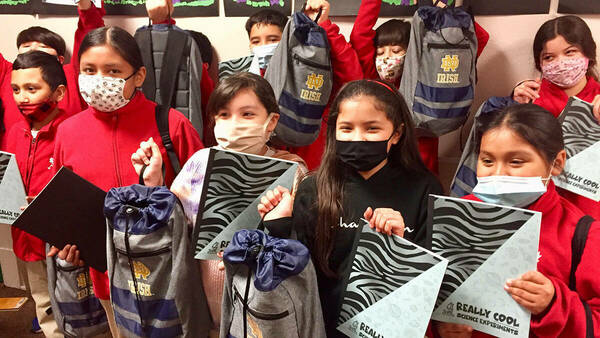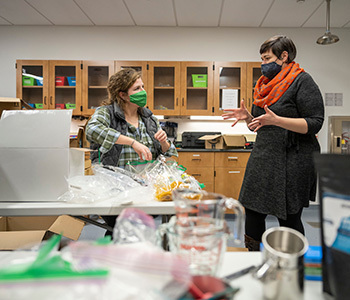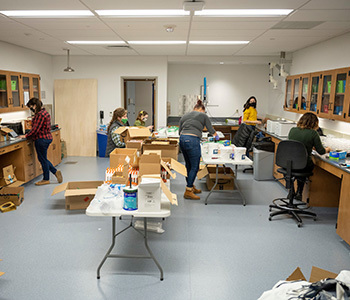
Off-the-shelf lab kits were just not satisfying 6-year-old Ruby, but her curiosity about science persisted. Luckily for Ruby, her aunt happens to be “in the biz,” and wasn’t going to let the budding researcher go without. Aunt Cara Ocobock, also a Notre Dame assistant professor of anthropology, decided to personally curate a lab manual and kit for her niece.
“I tried to think about what I wanted when I was that age and what I wanted to learn. I wanted to combine that with what I have learned as a scientist to make the lab manual educationally valuable,” Ocobock said.
Ocobock pulled science experiments that were publicly available online that demonstrate the scientific method — some that Ruby can do herself, and some that will require adult supervision. She then gathered all the materials Ruby would need to conduct the experiments. Along with each experiment, Ocobock included a profile of a woman scientist.
“I wanted to represent women and women of color,” she said. “This was very much directed at my niece.”

After completing the manual that totals 28 experiments appropriate for ages 5 to 10, Ocobock posted it on her professional website and on Twitter. The kit then went what she described as “low-key viral.” Her inbox was flooded with requests for manuals and her Twitter followers nearly tripled.
“I did not expect the response,” she said. “It never dawned on me that kids are at home. It never occurred to me the kind of need there is for this. I was sending the manual to people in places like Malaysia and Eastern Europe. I will never fully understand how far it went.”
About the same time, Ocobock told Morgan Munsen, a doctoral student in neuroscience, about the manual at a Science Cafe event, leading to a discussion about how to ensure access to the manual locally among students from disadvantaged backgrounds from two distinct perspectives: language and the materials needed to perform the experiments.
“It just snowballed from there,” said Munsen, who is also the community director with the Science Policy Initiative (SPI), a student-run organization that engages Notre Dame students in issues at the intersection of science and public policy and promotes science and technology within the South Bend-Elkhart community.
In coordination with Ocobock and with support from the broader SPI community, Munsen successfully applied for two grants: a $5,500 Community Impact Grant from the Center for Social Concerns at Notre Dame and a $1,000 grant from the National Science Policy Network. The John J. Reilly Center for Science Technology and Values, the sponsoring organization for SPI and source of faculty mentorship, also generously agreed to cover up to $2,500 in additional funding to cover any remaining costs associated with the project.
Grant money in hand, Sasha Padilla-Coley, a doctoral candidate in biochemistry at Notre Dame and co-president of SPI, hired a fellow graduate student, Colombian-born Sebastián Murgueitio Ramírez, to translate the manual from English to Spanish. A doctoral candidate in the history and philosophy of science, Murgueitio Ramirez previously created an online Spanish-language textbook aimed at the South American market. He also helped Don Howard, a professor of philosophy at Notre Dame, digitize an obscure but influential newsletter devoted to the foundations of physics.
Meanwhile, Munsen coordinated with St. Adalbert Catholic School, where her husband works as a middle school religion teacher, to supply students there with kits containing chemicals, petri dishes and other materials specific to the manual over winter break.
St. Adalbert is a PK-8 school serving mostly lower-income, Spanish-speaking households on South Bend’s west side. The school has an existing relationship with Fisher Hall, whose annual regatta benefits St. Adalbert. Both Fisher and McGlinn hall residents volunteer as tutors at St. Adalbert.
“While many of these materials can be found around the home, some are hard to source and some are more expensive,” said Munsen. “We wanted to make sure there was not a barrier to access for these materials, whether price or availability.”
At the same time, Munsen said, “During a pandemic, especially, parents are busy. Having all the materials there and the manual, and in a language they speak, not only enriches the student, but is something fun that kids and parents can do together.”
Led by Munsen, SPI purchased the materials individually and in bulk with support from Notre Dame Procurement Services. Science faculty from across campus, including Michelle Whaley, teaching professor of biological sciences; Nancy Michael, associate teaching professor of biological sciences; and Joshua Koen, assistant professor of psychology, donated items such as petri dishes and balloons. Headed by Dean Mary Galvin, the College of Science donated several hundred dollars to print physical copies of the manual for the students. SPI took advantage of fast shipping via Amazon for bulk purchases.
Finally, SPI Co-President Robert Stanley negotiated with Hammes Notre Dame Bookstore for a discount on 150 Notre Dame-branded backpacks to gather and transport the lab materials.

Volunteers from both SPI and the Association for Women in Science at Notre Dame assembled the kits and packed the backpacks over several days in early December. Following coronavirus protocols, SPI delivered the backpacks to St. Adalbert during off hours on Dec. 16 — one for every student in grades one through six. Teachers distributed the backpacks to the students before the start of winter break.
“I’m blown away by how hard our volunteers — especially the students — have worked and how detail-oriented they’ve been to prepare the kits for these kids,” said Ocobock.
Joe Miller, principal at St. Adalbert, said “We are overwhelmed by the generosity of these science experiment gifts. Our students love the prospect of doing science, and they happen to like the ND bags quite a bit too!”
He continued, “As an over 70 percent English learner school, we rightfully spend an extraordinary amount of time and energy in our school building on reading and language arts. An unintended consequence of our emphasis on language arts is that science at times gets short shrift. These science kits will go a long way in kindling an interest in science for our students.”
What’s more, Miller said, the kits “come at a perfect time as we anticipate spending some extended time in remote learning in the coming semester. Our teachers will now be able to say, ‘Go get your science lab backpack’ and then conduct live online science experiments from home — but together. There is no way we could have ever pulled off that quality of a lesson without this generous gift.”
He concluded, “Notre Dame has been and will continue to be a great partner at St. Adalbert School — this gift is one more link strengthening our relationship.”
Looking ahead, Munsen said SPI hopes to provide materials to additional students and schools depending on financing, among other factors.
“It would be great if we could expand it further into the community,” said Padilla-Coley. “If we’re able to get more grants, it’s feasible.”
If you would like to support this effort, contact Assistant Professor Ocobock at cocobock@nd.edu.
Originally published by at news.nd.edu on December 18, 2020.